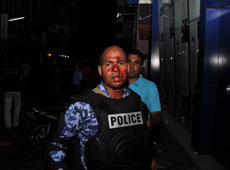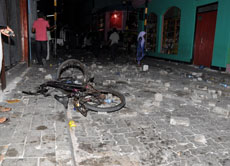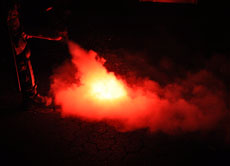Finance Minister Ahmed Inaz was approved by parliament in late April 2011, replacing Ali Hashim who was among President Mohamed Nasheed’s cabinet ministers to be ousted by the opposition-majority parliament. He was approved just as the government implemented a managed float of the rufiya, and spoke to Minivan News about the recent and rapid changes to the country’s economy, the challenges it is facing and the future outlook.
JJ Robinson: An International Monetary Fund (IMF) mission is in town following the conclusion of the Article IV consultation last year. What is the current status of the government’s involvement with the IMF?
Ahmed Inaz: The IMF is discussing a new three program [with the government]. We are talking about structural adjustments that need to be brought in, and on the revenue side we are agreeing measures we foresee need to take in the next two years. We are trying to agree on the policy side.
They have their suggestions and recommendations and we have the policies the President is proposing, and we are trying to come a common agreement hopefully by the start of next week. I’m hopeful we will re-enter the program.
JJR: The IMF delayed the third tranche of funding in November last year citing “significant policy slippages” on behalf of the government. Did the third tranche get delivered?
AI: The question is not about that, the question is what can be practically done in this country. The new government came in with a new democratic setup, but not the budget to support that. The budget didn’t carry the cost of the new reforms.
It is not a matter of whether we can cut down expenditure – yes there are fat layers in the country, not only in the civil service, also in the judiciary and independent institutions. But the fundamental issue is that because of the democratic transition we have a state with recurrent expenditure higher than its revenue.
To make matters worse, the salaries of the state payroll are higher than our income. You can see where the problem lies.
What we foresee is that there are two ways in which we have to work to rectify this issue.
One is to trim the fat layer, by matching outputs with staff and increasing productivity.
The other thing is by increasing our revenue. We need to move from the current inefficient way of raising revenue – which bases revenue on import duties – to a more direct taxation policy.
We currently have the import duty which is a burden for businessmen, because they are taxed before they sell. We will abolish most duties, apart from those on items that are environmentally damaging, those that affect health, and other discouraged items.
The rest will be abolished and we will move into a direct taxation policy when the business profit tax starts in July. We have also started collecting revenue from a Tourism Goods and Services Tax (TGST), and we propose that we increase this as well as introducing a general GST for the public, and an income tax.
This would not be a payroll tax. It would be an income tax on people earning above Rf 30,000 (US$2300) per month. We think this is more justifiable.
Some may feel that this will collect only a very small amount of revenue – but this not just revenue from employment, but income from business dividends, house sales and so forth.
JJR: The former auditor general reported difficultly getting people to declare assets. Is this difficult with high net-worth individuals in the Maldives?
AI: One thing you have to understand is that this is a path other countries have walked. I remember when I was doing my graduate studies, even then we were talking about this. It was something the educated intellects were advocating. It never happened because there was no political willingness – willingness we now have.
I believe that once we start we will sort the rest of the issues. The TSGT is already being taken from big resorts as well as small guest houses on remote islands – very small businesses. They declare – amazingly, they declare.
I think this is something the country can take, and then we can move to rectify problems and perfect the system.
JJR: The general popularity of the idea seems quite sour with members of the opposition. How do you propose getting this tax through the opposition-majority parliament?
AI: All the businessmen I have met – all the reasonable businessmen I have met – believe that the country has to move to a much more structured, predictable and more coherent system of governance. And to do that we need an economic system that supports social change, and supports the change we have brought politically.
To sustain their businesses it is important that they have social and political stability. It would be a grave mistake if one stands up and says they don’t support [income tax], because that will bring instability to the country and harm businesses.
The other thing is that once you have a system of redistributing wealth through direct tax, such as we are proposing, this is spent on infrastructure, welfare, education, transport – all of these things that directly benefit wealthy businessmen, because they don’t have to pay for it on an individual basis. So the cost of doing business will be lowered.
I believe MPs, businessmen and business-MPs will support this. Those I have met have given their full support – they just want to be consulted first.
JJR: Don’t you think that as a potentially populist issue this may become a victim of the country’s adversarial politics?
AI: I think the opposition is very mature. When we were in the opposition, then the opposition was very mature. I think they will choose the best for the country. We are doing the tough job here – by 2013 the game will be easier. We are laying the foundation for the country, not only by changing the political scenario but bringing huge economic changes. I think they will support it.
JJR: Back to the IMF. A theme in their reports last year – and also those of the World Bank – was that while the Maldives’ income might be increased gradually, the country’s immediate problem was the inflated state budget, leading to a high deficit, while the country was at the same time insisting on a pegged currency. The government’s attempt to introduce cuts last year were scuttled – in your mind what were the reasons for this?
AI: One thing was that the business profit tax was delayed in parliament – for reasons I don’t think I have to elaborate. The TGST we proposed was higher than what are getting now, and that has also had an impact on us.
Also we have to remember that the redundancy of the civil service is not an easy thing – the country’s employment has been totally dependent on the government. It is a very big change, and we have said we want the government to be a policy maker, a regulator, but not doing business, so jobs are created in the private sector.
I’m happy to say our redundancy program – with assistance from the Asia Development Bank (ADB) – has to this date enrolled 800 people and already some of them have already been paid and moved out of the civil service. We hope over the next few weeks we will achieve our target of 1300 – the idea is that they will retrained and not return to the government for at least three years.
JJR: A key criticism of the government’s economic policy from the opposition is its spending on political appointees.
AI: Out of total government expenditure, 75 percent is paying the payroll. The political appointees are three percent of that payroll.
I believe that any appointee, whether political, civil service or judicial – any unproductive appointee – is a burden on our system and we should make them redundant.
JJR: Enmity between the Finance Ministry and the Civil Service Commission (CSC) last year led to the ministry filing charges with police against the CSC, just as the cuts issue entered the court system. What is the relationship like now between the Ministry and the CSC?
AI: We are working very closely with them and they have been very cooperative on the redundancy issue.
JJR: A number of private sector businesses have expressed concern that while the Maldives Monetary Authority (MMA)’s decision to enforce the use of the rufiya for all transactions is fine when you have a freely-convertable currency, it presents a serious problem when the banks refuse to sell dollars to them.
AI: The government doesn’t print dollars, and the government doesn’t earn dollars, except for fees and taxes, which is a very small percentage of the total demand for dollars in the country. The dollars are earned primarily by the resorts and fish exporters.
What we want is a system where the foreign exchange system operates as a market. We have introduced a banded float [within 20 percent of the pegged Rf12.85 to the dollar]. What we want is that the dollar earners will sell this to the market, and within the next three months an equilibrium will be achieved.
I don’t mean a low rate – I mean an equilibrium. Once that is set and the speculation and market adjustment has competed, we will have addressed the fundamental reason as to why the black-market existed.
Firstly, because the existing laws and regulations were not enforced, and existing legislation relating to money changers legislation was not being enforced – we cannot have 220 money changers in the country. I have not seen this in other countries. They have to be proper money changers who have invested a certain amount of capital, just like the banks.
I emphasise this but I still don’t get the commitment I need from stakeholders to address it.
Secondly, the monetary regulation states that rufiya is the legal tender for all transactions, with the exception of the government’s collection of taxes and fees. I think we should enforce this irrespective of the sector. We should have rufiya prices – what other country has prices in another country’s currency?
You can still pay in dollars – but this is the exchange rate. For [the customer] it may still seem as though you are paying in dollars, but the transactions are actually happening in rufiya. In Colombo you pay in local currency, even if you use your credit card. We need to have that enforcement irrespective of the sector.
In the medium term we need to address the budget deficit, especially recurrent spending, which has to be matched with income. A state cannot be operated without matching recurrent expenditure to its income – that is madness. A state has to have a prudent economic system – capital expenditure can still be borrowed, because future returns are there.
We working with the ministries to streamline and reduce the deficit in the budget. Next year we are hoping to have a balanced budget.
JJR: The opposition-majority parliament has substantially added to the last two budgets submitted by the government, and the President has been compelled to ratify these. How do you deal with this?
AI: We are trying to work on the legal side as well as the practical, and make sure this is enforced – at least that recurrent expenditure and income is matched, and that any additional bill passed during that particular year is supported with a revenue measure.
They can’t just simply tell us to pass a budget, and then pass bills giving us additional expenditure – every bill comes at a cost. What we propose is that they think about this and rectify it – this is very important.
The third long term goal is increasing productivity and exports, to make sure that whichever government is in power, our manifesto continues and the country can move forward. We need exports to be increased, and earn dollars. Long term, that is the only solution to counter this [economic situation]. In the long run there should be a regulatory framework that supports this.
JJR: Speaking of the regulator, where does the Maldives Monetary Authority (MMA) fit into this? It was only recently that the government was calling for the resignation of MMA Governor Fazeel Najeeb for failing to help address the situation.
AI: I don’t want to dwell on that. For me the governor – whoever is there – I should work with them. What I want is the regulations to be there. For example, the devaluation of the currency within this 20 percent band – that has to be supported.
Once we make a decision, such as the devaluation, we cannot go back. The fundamental health of the economy told us that we had to do this. The President met with the MMA Board, which advised, and a decision was made. It is not time for us to affect the confidence of the economy – an economy cannot survive without confidence. That is the crucial factor an economy needs – and state institutions need to ensure that confidence is there.
JJR: If the government was convinced that the value of the rufiya was going to fall somewhere within that band, why not float the currency altogether?
AI: The reason what that if we float the currency it would have short-term consequences and immediate jumps. A band means the government will defend that band – that is what we are doing with the weekly auction of dollars to the banks.
Secondly we have numbers from the TGST income that suggest we have been underestimating our economy. By having our policies in place – productivity increasing policies and growing additional exports – we are confident we can pull the value of the rufiya down to 10 in the long term – that is our aim. It is not a joke.
JJR: There is a lot of concern, particularly in resort circles, that the new policy restricting expatriate remittances will reduce the willingness of people to work in the Maldives. What was the logic behind that decision?
AI: We understand that expatriate employees are very important. We will never hurt them and we will ensure that their interests are protected. The regulation that the Ministry and MMA are working on will only limit repatriation of what they earn legally under their contract. If they remit more, obviously they will have been earning illegally.
They are living and spending in the Maldives as well – but they can still repatriate up to what they earn. What we are trying to do is limit illegal workers [remitting dollars out of the country].
JJR: If at the same time you are enforcing use of the rufiya when there is some doubt as to whether you can walk into a bank and exchange that into dollars to remit it overseas – does that not impact confidence in the economy?
AI: We believe the market is currently unstable because of the changes we have brought, and that these changes will take three months for the various variables to work. In that period the government will work with the MMA to ensure that stability exists.
There will be a lot of low confidence and instability, and that will not only be felt by the expatriates. All our imports and consumables, medicine, education – is imported. But we are confident we can get through this.
JJR: Potential foreign investors looking at the economy and observing the recent changes may be unsettled by this instability. How do you address this concern?
AI: The current government is a centre-right government, and we are opening our doors to an unimaginable level for foreign investment.
We will not be treating foreign investors different from local businesses. We will not put in unreasonable controls on the economy, and we will make sure foreign investors are consulted, as with the locals.
We have not done this in the past.because we have been very tightly focused on politics as well as the economy, and haven’t been able to communicate as much in English perhaps as we should have.
I believe [foreign investors] have confidence in our economy, and we will ensure their investments are protected in this country, and that wel continue to have policies to encourage further investment. This country does not have a solid financial sector so we need foreign investors very much. That is understood by the current government, and the policy is to attract foreign investors.
JJR: So economy before politics from here on in?
AI: Yes. Until the next election!
Likes (0)Dislikes
(0)Dislikes (0)
(0) 

